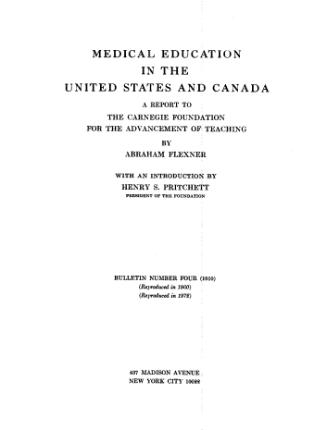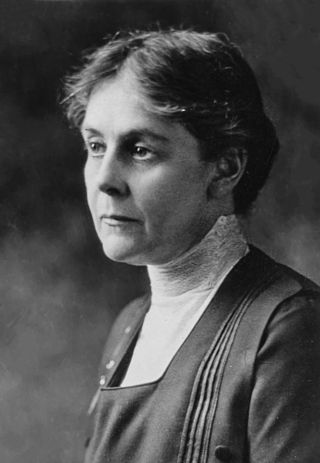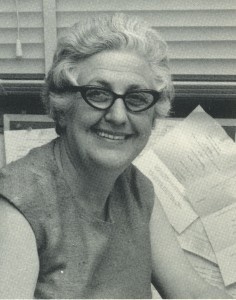Related Research Articles
Lawrence Oglethorpe Gostin is an American law professor who specializes in public health law. He was a Fulbright Fellow and is best known as the author of the Model State Emergency Health Powers Act and as a significant contributor to journals on medicine and law.

The Flexner Report is a book-length landmark report of medical education in the United States and Canada, written by Abraham Flexner and published in 1910 under the aegis of the Carnegie Foundation. Many aspects of the present-day American medical profession stem from the Flexner Report and its aftermath. The Flexner report has been criticized for introducing policies that encouraged systemic racism.

Alice Hamilton was an American physician, research scientist, and author. She was a leading expert in the field of occupational health and a pioneer in the field of industrial toxicology.

Isaac Max Rubinow was a leading theorist on social insurance and one of the most influential writers on the subject. Rubinow had an M.D. from New York University Medical School and held a Ph.D. in economics from Columbia University. His 1913 book, Social Insurance, was the most influential early work on social security. His work impacted a generation of social reformers, including President Theodore Roosevelt, who used Rubinow's work in drafting the Progressive Party platform in 1912. The Progressive Party was the first of its kind to call for social insurance.

Paul Elliot Starr is a professor of sociology and public affairs at Princeton University. He is also the co-editor and co-founder of The American Prospect, a notable liberal magazine created in 1990. In 1994, he founded the Electronic Policy Network, or Moving Ideas, an online public policy resource. In 1993, Starr was the senior advisor for President Bill Clinton's proposed health care reform plan. He is also the president of the Sandra Starr Foundation.

Carola Blitzman Eisenberg was an Argentine-American psychiatrist who became the first woman to hold the position of dean of students at Massachusetts Institute of Technology. From 1978 to 1990, she was the dean of student affairs at Harvard Medical School (HMS). She has for a long time been lecturer in the newly renamed Department of Global Health and Social Medicine at HMS. She was also both a founding member of Physicians for Human Rights and an honorary psychiatrist with the Massachusetts General Hospital in Boston, a longstanding position there.

Karl Sudhoff was a German historian of medicine, helping establish that field as a legitimate discipline for research and teaching within faculties of medicine.

Henry Ernest Sigerist was a Swiss medical historian and proponent of universal health care.
Carl Ernest Taylor, MD, DrPH founder of the academic discipline of international health who dedicated his life to the well-being of the world's marginalized people. He was the founding chair of the Department of International Health at the Johns Hopkins Bloomberg School of Public Health. He was a key contributor to the Alma Ata Declaration. At the age of 88, this energetic man assumed the challenging position as Country Director for the nonprofit organization Future Generations Afghanistan where he led innovative field-based activities until age 90. He has worked in over 70 countries and have students from more than 100 countries. He was sharing this near century-long perspective with his students up until a week before his death.
Scott I. Kahan, M.D., M.P.H., is an American physician, writer, and internationally recognized expert on obesity prevention and treatment. He is the director of the Strategies To Overcome and Prevent (STOP) Obesity Alliance, a nonprofit coalition of more than 70 consumer, provider, government, labor, business, health insurers and quality-of-care organizations and the director of the National Center for Weight and Wellness. His clinical practice and research addresses obesity prevention and treatment, chronic disease risk reduction, health behavior change in populations, and clinical aspects of weight management. His public policy work focuses on expanding access to care for obesity treatment services, addressing weight stigma, and training physicians in obesity treatment modalities.
Joseph P. Newhouse is an American economist and the John D. MacArthur Professor of Health Policy and Management at Harvard University, as well as the Director of the Division of Health Policy Research and of the Interfaculty Initiative on Health Policy. At Harvard, he is a member of the four faculties at Harvard Kennedy School in Cambridge, Harvard Medical School in Boston, Harvard T.H. Chan School of Public Health in Boston, and Harvard Faculty of Arts and Sciences in Cambridge.
Michael Stuart Gottlieb is an American physician and immunologist known for his 1981 identification of acquired immune deficiency syndrome (AIDS) as a new disease, and for his HIV/AIDS research, HIV/AIDS activism, and philanthropic efforts associated with HIV/AIDS treatment.

Howard Markel is an American physician and medical historian. Markel is the George E. Wantz Distinguished Professor of the History of Medicine at the University of Michigan and Director of the University of Michigan's Center for the History of Medicine. He is also a professor of psychiatry, health management and policy, history, and pediatrics and communicable diseases. Markel writes extensively on major topics and figures in the history of medicine and public health.
George Rosen (1910–1977) was an American physician, public health administrator, journal editor, and medical historian. His major interests were of the relationship of social, economic and cultural factors upon health.
Rashi Fein was an American health economist termed "a father of Medicare" in the United States and "an architect of Medicare," was Professor of Economics of Medicine, Emeritus, in the Department of Global Health and Social Medicine at Harvard Medical School, and the author of the book Medical Care, Medical Costs: The Search for a Health Insurance Policy.
Thomas A. LaVeist is dean and Weatherhead Presidential Chair at the School of Public Health and Tropical Medicine at Tulane University in New Orleans, Louisiana. He was previously chairman of the Department of Health Policy and Management at the George Washington University, Milken Institute School of Public Health. He focuses mainly on the development of policy and interventions to address race disparities in the health field.
Donald S. Burke is an expert on the prevention, diagnosis, and control of infectious diseases of global concern. He is a distinguished University Professor of Health Science and Policy at the University of Pittsburgh.

Elizabeth Fee, also known as Liz Fee, was a historian of science, medicine and health. She was the Chief of the United States National Library of Medicine History of Medicine Division.

Shifra Shvarts, born in June 1949, holds the position of Professor Emeritus at the Center for Medical Education within the Faculty of Health Sciences at Ben-Gurion University. In addition to her academic role, she is a dedicated researcher specializing in the field of medical history. Shvarts holds significant positions as the Deputy Director-General of the International Society for the History of Medicine and as the Deputy Secretary General of the World Organization for the History of Medicine. Her research focuses on the examination of healthcare services' history and evolution in Israel, as well as the history of public medicine.

Mindel Cherniack Sheps was a Canadian physician, biostatistician and demographer. She held academic appointments at Harvard Medical School, University of Pittsburgh, Columbia University and UNC Chapel Hill, where she was Professor of Biostatistics.
References
- ↑ People – Theodore Brown, Department of History. 2014.
- ↑ ”American Journal of Public Health. Volume 103, Number 3. March 2013.
- ↑ "Editorial Cartoons and Health Care Reform" C-Span (New York, New York: C-Span, February 6, 2013)
- ↑ University of Rochester Faculty Experts Directory, 2013.